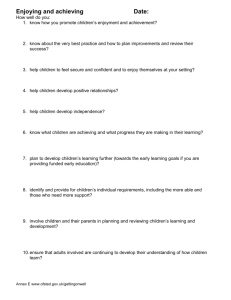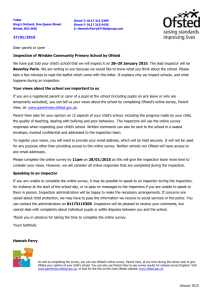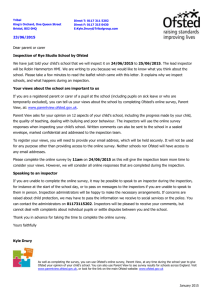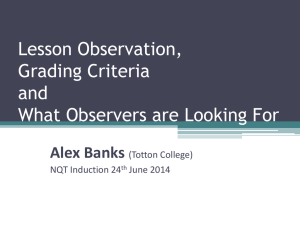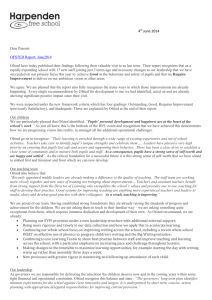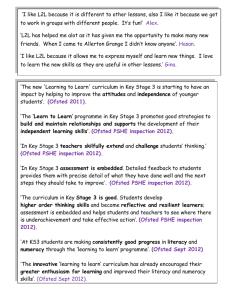Ofsted inspections - ClarificationForSchools
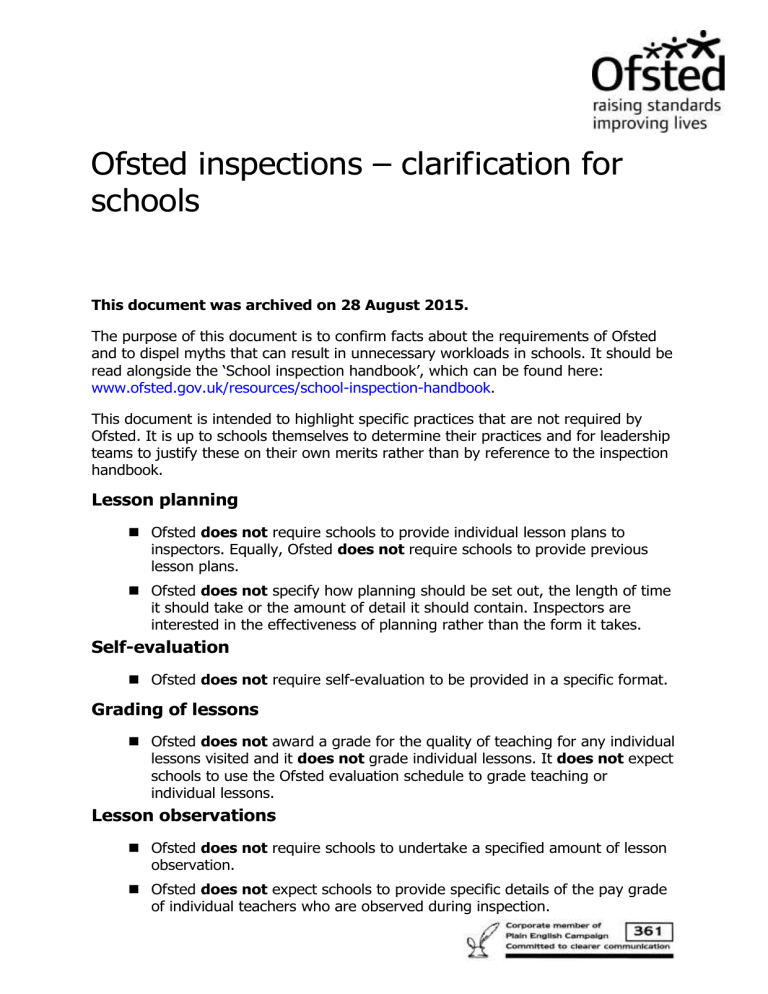
Ofsted inspections – clarification for schools
This document was archived on 28 August 2015.
The purpose of this document is to confirm facts about the requirements of Ofsted and to dispel myths that can result in unnecessary workloads in schools. It should be read alongside the ‘School inspection handbook’, which can be found here: www.ofsted.gov.uk/resources/school-inspection-handbook .
This document is intended to highlight specific practices that are not required by
Ofsted. It is up to schools themselves to determine their practices and for leadership teams to justify these on their own merits rather than by reference to the inspection handbook.
Lesson planning
Ofsted does not require schools to provide individual lesson plans to inspectors. Equally, Ofsted does not require schools to provide previous lesson plans.
Ofsted does not specify how planning should be set out, the length of time it should take or the amount of detail it should contain. Inspectors are interested in the effectiveness of planning rather than the form it takes.
Self-evaluation
Ofsted does not require self-evaluation to be provided in a specific format.
Grading of lessons
Ofsted does not award a grade for the quality of teaching for any individual lessons visited and it does not grade individual lessons. It does not expect schools to use the Ofsted evaluation schedule to grade teaching or individual lessons.
Lesson observations
Ofsted does not require schools to undertake a specified amount of lesson observation.
Ofsted does not expect schools to provide specific details of the pay grade of individual teachers who are observed during inspection.
Pupils’ work
Ofsted does not expect to see a particular frequency or quantity of work in pupils’ books or folders. Ofsted recognises that the amount of work in books and folders will depend on the subject being studied and the age and ability of the pupils.
Ofsted recognises that marking and feedback to pupils, both written and oral, are important aspects of assessment. However, Ofsted does not expect to see any specific frequency, type or volume of marking and feedback; these are for the school to decide through its assessment policy.
Marking and feedback should be consistent with that policy, which may cater for different subjects and different age groups of pupils in different ways, in order to be effective and efficient in promoting learning.
While inspectors will consider how written and oral feedback are used to promote learning, Ofsted does not expect to see any written record of oral feedback provided to pupils by teachers.
If it is necessary for inspectors to identify marking as an area for improvement for a school, they will pay careful attention to the way recommendations are written to ensure that these do not drive unnecessary workload for teachers.
Evidence for inspection
Ofsted does not expect schools to provide evidence for inspection beyond that set out in the inspection handbook.
Ofsted will take a range of evidence into account when making judgements, including published performance data, the school’s in-year performance data and work in pupils’ books and folders. However, unnecessary or extensive collections of marked pupils’ work are not required for inspection.
Ofsted does not expect performance- and pupil-tracking data to be presented in a particular format. Such data should be provided to inspectors in the format that the school would ordinarily use to track and monitor the progress of pupils in that school.
Ofsted does not require teachers to undertake additional work or to ask pupils to undertake work specifically for the inspection.
Ofsted will usually expect to see evidence of the monitoring of teaching and learning and its link to teachers’ performance management and the
Teachers’ Standards, but this should be the information that the school uses routinely and not additional evidence generated for inspection.
Ofsted does not require schools to provide evidence for each teacher for each of the bulleted sub-headings in the Teachers’ Standards.
Statutory provisions
2
Ofsted will report on any failure to comply with statutory arrangements,
Ofsted inspections – clarification for schools
March 2015, No. 140169
including those relating to the workforce, where these form part of the inspection framework and evaluation schedule (Part 2 of the ‘School inspection handbook’).
Ofsted inspections – clarification for schools
March 2015, No. 140169
3
